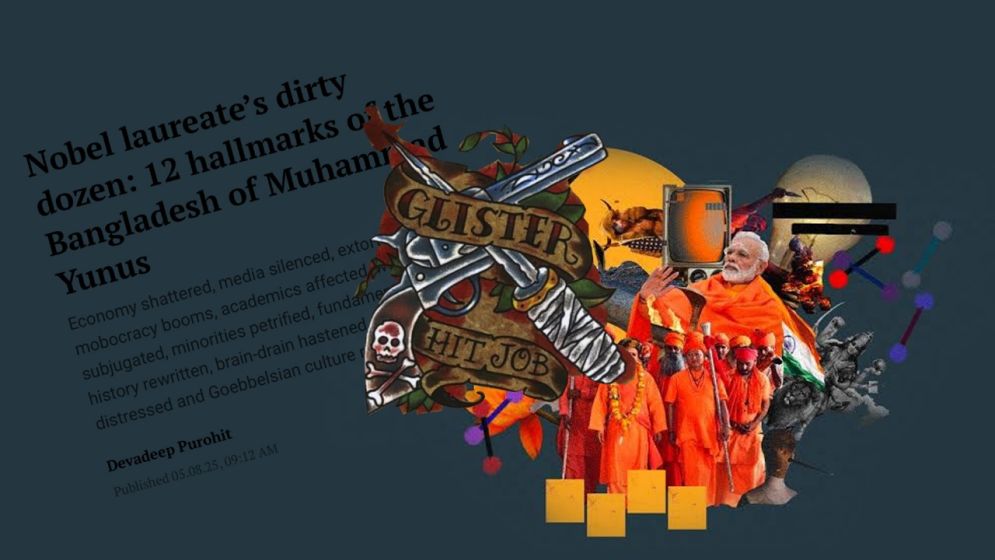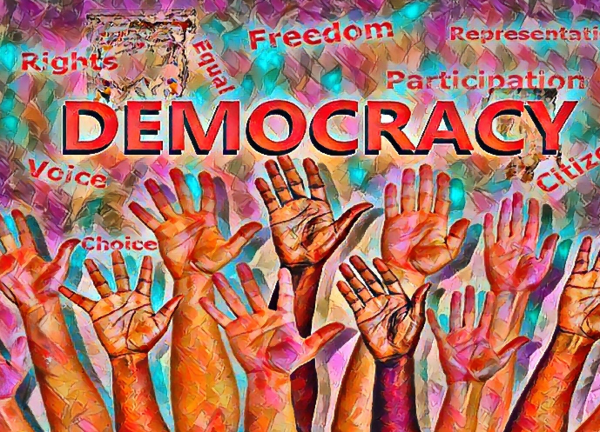India’s dirty dozen lies: A rebuttal to telegraph’s hit job on Dr. Muhammad Yunus

When a regime of fascism collapses, it’s not just thugs and oligarchs who panic–it’s also the court journalists who live off their crumbs.
Devadeep Purohit’s article in The Telegraph India titled “Nobel Laureate’s Dirty Dozen” is anything but a journalistic assessment. It is a propaganda pamphlet–penned in sync with the narratives of absconding Awami League fugitives hiding in Kolkata and the very Delhi deep state that is systematically erasing the Bengali language in West Bengal itself.
What credibility can a man have who cries over “rewriting history” in Dhaka while watching silently as Delhi strips off his own linguistic dignity back home?
This is a point-by-point rebuttal of his politically motivated lies and distorted narrative.
1. “Economy shattered” — Truth: India lost access to Bangladesh’s economy, not the economy itself
The real panic in Purohit’s tone stems from the sudden evaporation of Indian control over Bangladesh’s economic levers.
For over a decade, Bangladesh was run like an eastern economic outpost of New Delhi–with port access, transit rights, energy corridors and illicit trade all flowing one way.
What Yunus inherited was not a “stellar economy” but a paper castle: inflated GDP figures, unpaid foreign debts, and a banking sector parasitized by politically connected families.
The so-called “growth” under Hasina was largely unaccountable aid inflow and capital flight.
2. “Media silenced” — Truth: India’s pet reporters are mourning the collapse of their propaganda machines
Purohit claims to care about press freedom, yet when Hasina’s regime jailed cartoonists, banned TV channels, and exiled dissidents, his pen was silent.
Instead, people like Purohit helped churn out fake stories in the Indian press glorifying a dying fascist regime. When that regime collapsed in August 2024, Indian media–including his paper–ran a barrage of disinformation about “Islamist coups” and “foreign conspiracies.”
Now that justice is catching up with partisan media actors in Bangladesh, those who colluded with the Hasina regime are crying foul.

3. “Extortion culture” — Truth: You
can’t lecture a post-fascist state about cleanup when you enabled the criminals
If extortion is now a “culture,” who sowed the seeds?
The Awami League had institutionalized extortion–police, tax officers, customs officials, and ruling party cadres all ran syndicates. The difference now is that those with ties to the new government are being prosecuted when credible allegations arise.
Purohit’s use of anecdotes ignores systemic audits and restructuring initiatives already underway under Yunus’s administration.
4. “Mobocracy booms” — Truth: The mob rule was created by the Awami League, not the people who ousted it
Purohit conveniently forgets how mobs–often under direct orders from political thugs–were deployed during Awami rule to grab land, beat up opposition, and assault minority protestors.
That legacy doesn’t disappear overnight.
Instead of aiding the clean-up, Purohit romanticizes past war criminals and projects isolated cases as state policy. That’s intellectually dishonest.
5. “Academics affected” — Truth: Bangladesh is dismantling a caste-based intellectual cartel, and Delhi hates that
The so-called “academic elite” in Bangladesh were selected based on loyalty, not merit, under the previous regime. Their function was to create an echo chamber of praise, not academic inquiry.
Now that a new wave of youth leaders has emerged from the streets, challenging colonial education models and Western mimicry, the old guard is rattled. The re-centering of Bengali Islamic history, decolonial thought, and civic agency is terrifying to the Dhaka–Delhi/Kolkata intellectual pipeline.
6. “Women subjugated” — Truth: Purohit’s outrage is reserved only for elites, not the everyday Bengali woman
The real story here is that women from rural, working-class, and religious communities are being included in national dialogues—for the first time in decades. The regime’s engagement with all segments of society threatens the NGO-industrial complex that profited by portraying all Bengali women as victims in need of elite saviors.
Purohit never wrote a line when rape cases were swept under the carpet during Hasina’s time. But now he finds moral clarity? Hypocrisy, thy name is Delhi media.

7. “Minorities petrified” — Truth:
Purohit ignores the upper-caste propaganda machine that exploited Hindu lives
for decades
If there is one community most betrayed by Delhi’s propaganda machine, it is the poor, lower-caste Bengali Hindus—used as pawns during communal tension, then abandoned.
The narrative of “persecution” is generated not to protect these minorities but to weaponize their pain. Most attacks on Hindus were carried out during Awami League’s tenure—while India remained silent to preserve its allies.
If Devadeep Purohit is genuinely concerned about Hindu lives, why doesn’t he ask: Why does India not offer asylum to persecuted Bengali Hindus from Bangladesh? Why does the BSF—India’s own border force—regularly shoot and kill these same Bengali Hindus crossing over from Bangladesh, just as they do to Muslims?
The truth is that India’s deep state, including its media assets, does not protect Hindus—it protects its political projects. And poor Hindus, like poor Muslims, are nothing more than fodder for their cynical theatre.
8. “Rising Fundamentalism” — Truth: Hasina and Delhi funded Islamists for years — Now the Hydra is being dismantled
The deep state in India helped weaponize Jamaat and Hefazat when it suited their goals—especially to counter BNP or other nationalist voices. Even under Hasina, war criminals like Delwar Hossain Sayeedi were politically leveraged.
The current government is actively investigating the re-emergence of radical networks and isolating bad actors. But unlike before, there are no “favored Islamists.”
9. “History Rewritten” — Truth: The Delhi-Kolkata script is no longer working, and that’s burning them alive
The myth that 1971’s legacy belongs solely to one family has finally been dismantled. For too long, history was a monopoly—curated by those who served Indian interests and suppressed alternate truths.
Removing the “Father of the Nation” from legal statutes is not historical erasure. It is historical correction.
It decentralizes the story of Bangladesh’s birth, and the Indian intelligentsia—especially in West Bengal—can’t handle the fact that their curated narratives are collapsing.
10. “Brain Drain Hastened” — Truth: Purohit should worry about India’s own exodus first
Before wagging a finger at Bangladesh, Devadeep should listen to Mohua Moitra or read Indian government reports about the massive exodus of Indian doctors, engineers, and students.
India’s own caste hierarchy, language erasure, and centralisation have created one of the largest brain drains in the world. If a Bangladeshi student wants to leave today, it’s often for freedom—not food.
Under Yunus, youth voices are heard, not harassed. That’s a future worth staying for.

11. “Diplomacy Distressed” — Truth:
India has lost all its friends and is now paying global penalties
Bangladesh’s relationship with India is strained not because of Dhaka, but because Delhi cannot accept that its neighbor wants autonomy. Meanwhile, India has no friends in the region—Nepal, Maldives, Sri Lanka, Bhutan, all distant.
Now even the US is shaking hands with Pakistan, and India is facing trade penalties and tariff hikes from the West for buying discounted Russian oil.
Delhi’s foreign policy lies in shambles. That’s not Bangladesh’s problem.
12. “Goebbelsian Culture” — Truth: Purohit describes Hasina’s regime, not Yunus’s
The language of “effervescence of revolution” and “Indian media propaganda” wasn’t invented by Yunus—it’s what was said by Hasina’s ministers when asked about forced disappearances, custodial deaths, or BDR massacre.
What Purohit can’t accept is that the very playbook he once cheered—using student groups, media, courts, and foreign backers—is now being flipped.
And this time, it is democratic forces using it to dismantle a colonial political cartel.
Clean your own house, Purohit
Before crying over “rewritten history” in Dhaka, Devadeep Purohit should look at Kolkata, where Delhi is methodically replacing Bengali with Hindi, disempowering Bengali Muslims, and treating West Bengal as a sub-state, not a state.
Rather than licking Delhi’s boots and living off Awami League’s stolen money, he should focus on preserving the Bengali language and identity in his own backyard—while he still has one.
This isn’t about defending Yunus. It’s about defending Bangladesh’s right to reclaim its sovereignty, its narrative, and its future.
India’s deep state no longer controls that future. And that’s what burns the most.
—
Arif Hafiz is a political analyst, cultural critic, and independent columnist.

